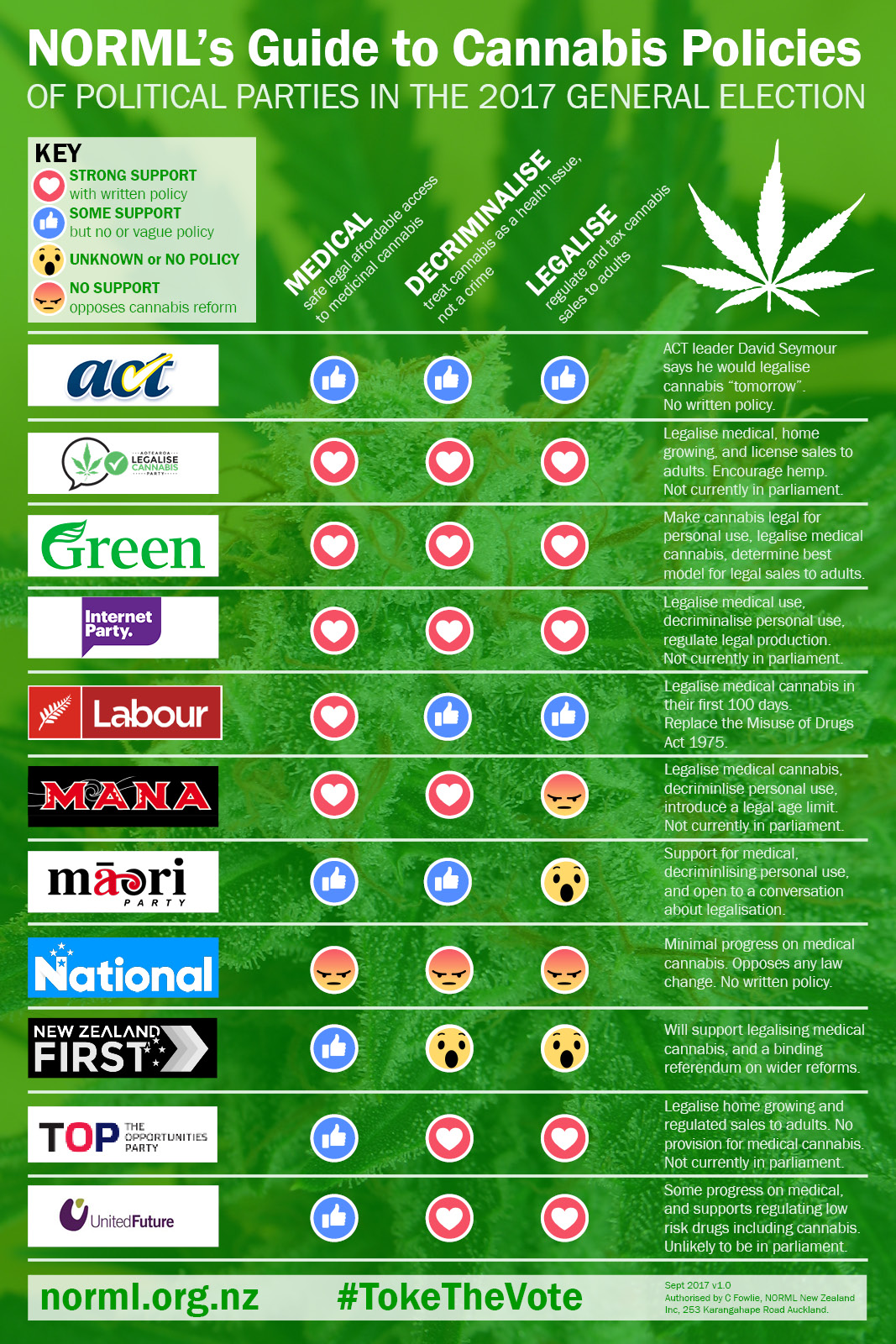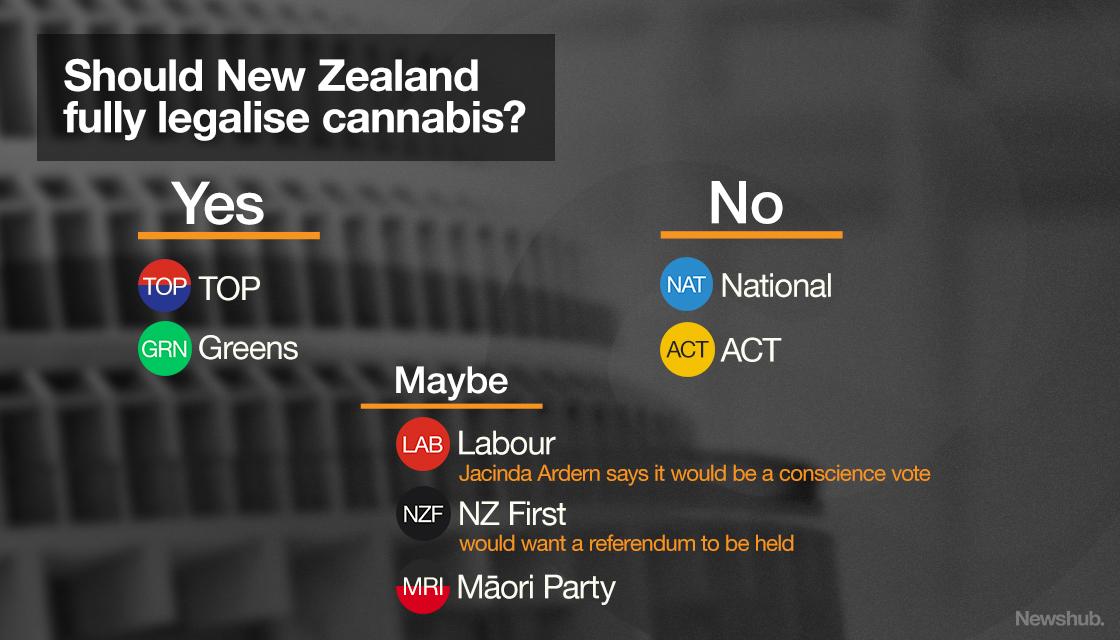More political parties are lining up firmly or cautiously behind cannabis decriminalisation – with even stronger backing for making the drug available for pain relief in certain medical cases.
There is also strong support among the public – around two-thirds support decriminalisation or legalisation of possessing a small amount of cannabis, according to a recent poll.
Decriminalisation means the drug would still be illegal, but offences punishable only by a fine with no criminal ticket, such as when a speeding ticket is issued.
Click here to view the policies interactive
Those backing drug law reform are more likely to be left-leaning, however there is still growing and majority support among National voters (60 per cent) and NZ First supporters (68 per cent).
New kid on the political block, Gareth Morgan’s the Opportunities Party (TOP), made legalising cannabis use for people over 20 policy after its own polling found the issue was easily the biggest motivator for under 35s.
However, reform is unlikely under National and not a priority for Labour.
Prime Minister Bill English has repeatedly made it clear cannabis won’t be decriminalised under his watch, saying the drug causes real harm.
The Labour Party says decriminalisation is not on its agenda – saying it wants to focus on housing, education and other core issues.
New Zealand First supports putting the decriminalisation support to the public in a referendum.
The Green Party has called for full legalisation and health spokeswoman Julie Anne Genter referenced TOP recently in telling voters it was her party that was the best chance for getting action.
The Maori Party has said it is supportive of a discussion about decriminalisation, but is also wary of the harm cannabis can cause.
Act leader David Seymour personally supports decriminalisation, but has said there is a risk in getting too far ahead of public opinion.
A spate of deaths linked to synthetic drugs has put the spotlight on drug law.
Associate Health Minister Peter Dunne responded by saying the problems with black market drugs showed why a regulated testing regime for psychoactive products was needed.
Legislation to set one up passed in 2013 but hasn’t worked because the Government banned the use of animal testing to prove whether recreational drugs were low-risk.
Dunne, the United Future leader who is retiring from politics after polls put him behind Labour’s Greg O’Connor in Ohariu, told a drug symposium at Parliament in July he favours a more liberal approach to drug law, but both National and Labour were conservative and holding back the pace of change.
The 2015-2020 National Drug Policy, developed under Dunne, has stressed drug use should be primarily seen as a health issue – a step hailed by the NZ Drug Foundation as signalling an “armistice in the War on Drugs”.
And in June the Government announced that restrictions around cannabidiol, or CBD, would be removed, meaning doctors could prescribe CBD products – extracted from cannabis but with little or no psychoactive properties – for pain relief.
Yesterday National unveiled an $82m package to reduce drug addiction by introducing hardline anti-gang measures and funding 1500 additional drug treatment places in rehabilitation centres and prevention services.
Police will get new powers to search the cars and houses of gang members at any time to check for firearms, and there will be higher penalties for manufacturing and distribution of synthetic cannabis.
Finally, compulsory police vetting will be introduced for anyone working at ports, mail centres or airport baggage centres, and drug dogs introduced at domestic airport terminals.
The biggest change to New Zealand’s drugs law in recent history will happen if a private member’s bill by Green MP Julie Anne Genter is successful.
Likely to be debated next year, it would let people with a qualifying medical condition cultivate, possess or use the cannabis plant and/or products, provided they have the support of a registered medical practitioner.
This would also apply to an immediate relative or other nominated person so they can administer or supply cannabis to the person.
Labour, the Maori Party, and Act have said they will back it at first reading to allow a committee to consider safeguards. NZ First is generally supportive of medicinal cannabis but has not revealed how it will vote.
National has not stated how its position, or if it will be a conscience vote for its MPs.
‘The difference would be massive’
/arc-anglerfish-syd-prod-nzme.s3.amazonaws.com/public/W6GY7NETOJFWVFN6LYGWR452XA.jpg)
A Golden Bay woman says legislation to free-up access to medicinal cannabis would make an enormous difference to her life and others who are currently illegally using the drug.
“The difference to my life would be massive,” said Rebecca Reider, who uses cannabis because she suffers from chronic pain.
“It is hard just to get the good stuff unless you grow your own, and a lot of us live in situations where we can’t. Most drug dealers don’t know what strain of cannabis they have…there is no quality control and huge personal risk involved.”
Reider has been an advocate for medicinal cannabis and spoken out in the media. Police raided her house a few years ago, and she now panics if she hears boots on her porch at an unexpected time.
“It is a crazy way of living knowing you are doing something illegal. It is to be able to stop living with this fear and stress that makes pain worse.”
Restrictions have been loosed to let doctors prescribe cannabidiol (CBD) products that are extracted from cannabis, but Reider said they do not provide relief for her because of the low amounts of THC and limited strains.
Green MP Julie Anne Genter’s bill will likely be debated next year and let people with qualifying medical conditions cultivate, possess or use cannabis. Reider spoke to the Herald from California, where she can easily get sign-off from a doctor to and go to a dispensary and choose from hundreds of varieties of cannabis.
Last year she travelled through Customs at Auckland Airport with an ounce of cannabis that had been prescribed during a visit to Hawaii after Customs confirmed the law allowed anyone who is prescribed a medicine overseas to bring a month’s supply into the country.
However, Ministry of Health officials updated advice on its website on December 7 that no cannabis prescribed in US states will be considered to have been lawfully supplied unless it was approved by the US federal government.
In the six months since this change, five people were stopped by Customs at the border after declaring they were carrying prescribed medicinal cannabis.
“Most people aren’t aware of that because they announced it two days after John Key resigned,” Reider said. “I don’t think they were really wanting a lot of attention on it.”













/arc-anglerfish-syd-prod-nzme.s3.amazonaws.com/public/L6ZWU6L2FJFKPGWNFEFJDLINJY.jpg)


